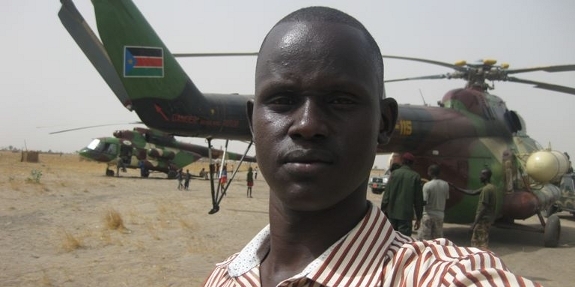The killing in South Sudan has little to do with tribal hatred and more with competing government salaries, says child soldier-turned-peace negotiator John Penn Ngong.
As a child, John Penn de Ngong joined the Sudanese People’s Liberation Movement SPLM in South Sudan, simply because a life with the rebels was better than life in a village that had no school and suffered dictator Omar al Bashir’s bomb attacks. The rebels offered schooling and, when independence was won in 2011, access to a state. That is where different trouble started, says De Ngong, now a civil society activist and peace negotiator: “It’s that new treasure trove and not old tribal tensions that led to the present violence.”
An independent state was what you wanted, but ethnic groups in the SPLM are now fighting. Thousands have died, tens of thousands live in refugee camps. Was the struggle in vain?
Bashir’s regime was killing us. We needed independence, but not a state machinery flush with petro dollars and donor aid. Our people got dazed with the big titles and the big chairs in air-conditioned offices in that fake London of theirs.
But couldn’t they just sit in those big chairs peacefully? Why did ethnic tension persist?
New leaders could not bring in everybody from every community and give them jobs and salaries. So they had to disadvantage some and promote others. President Salva Kiir brought in his Dinka community members to support his sweet seat. His deputy Riek Machar brought in more of his ethnic Nuer following too. The result was that one group felt it was getting less than the other.
Was there a specific trigger that lighted the flame?
When some SPLM leaders of Nuer background asked for reform of the party -and by implication their turn of the ladle-, they were turned down by President Kiir, who called them ‘rebels’ and ‘enemies of peace’. In a speech in December, Kiir pretended that he had been the only hero of the struggle, thereby humiliating Machar's supporters. This resulted into a shootout at night, which was exploited by Kiir as a ‘coup d’etat’. There were some arrests and Machar’s group took off for the bush.
Haven’t the Dinka and Nuer communities always been fighting?
There used to be clashes over cattle, but not like this. Traditionally, cattle rustling and the like do not aim at annihilating others because the neighbours must remain as the source of the next hunt. This new violence is informed by greed epitomised by the new political power. Those who don’t have salaries see that the state they fought for still doesn’t do anything for them. Public services like roads, water infrastructure, schools are not being built. People who have businesses or want to start them don’t receive support. So there is real anger, directed against those who seem to have become the elite. The saddest part is that both rival groups see the other as benefiting more than they do. That is where the fight turns ‘ethnic’.
This new violence also comes with terrifying cruelty. Old ladies have been burned.
Cruelty results from powerlessness and revenge. The revenge comes about when a soldier hears that their loved ones are murdered in their house. I interacted with some old friends who are now at the rebels' side in Addis and they told me that they feel a burning desire for revenge.
There have been peace negotiations in Addis Abeba. You took part for a while.
Our leaders are bickering over how many positions the one gets and how many the other. Our group, CYLOSS, the Coalition of Youth Leaders of South Sudan, was more or less dismissed.
Yet CYLOSS is made up of young people from different ethnic communities, who reject tribalism and want to promote peace and fairness. Why won’t they listen to you?
They are worried that others also want positions. Our leaders’ mistake, -also encouraged by the international donors and the countries that want our oil-, is that they believe that wealth only comes from the government. I just turned down an appointment to the Department of Communications and Public Relations in the Office of the President recently. I don’t want to take side in this ‘War of the Seats’.
There is hunger now, because people have been displaced and can’t tend to their fields and cattle. President Kiir has proposed he will pay the police more so that order can return. Is it a question of salaries again?
Even soldiers are hungry, which is extra dangerous because they will raid and kill for money. Paying salaries to keep people from killing works to some extent, but it is a dangerous cycle. It means that you get rewarded for being violent, and that people who are not violent get nothing.
Is there light at the end of the tunnel?
If the party leadership is reconciled, the rest of the country will follow suit. The government should stop following the agendas of corrupt lieutenants and also stop accusing the UN of being with the ‘rebels’. There, again, they use ethnic sentiments to cover up their own evil deeds. On our side we are trying to send the message that people must get rewarded for doing good jobs. We will also continue to encourage the youth to pull of this war, which only uses them as raw materials.
This interview was conducted by Evelyn Groenink, ZAM Chronicle’s investigations editor.


